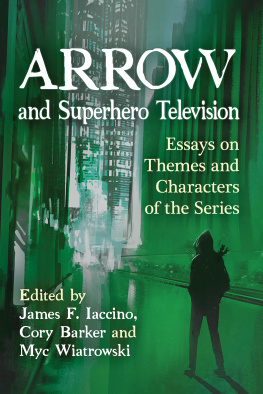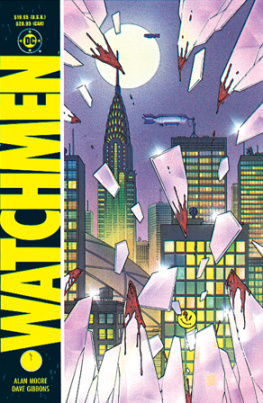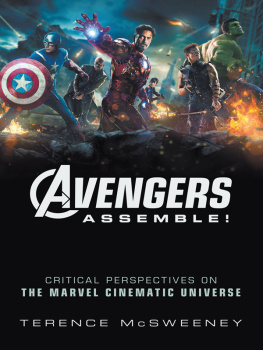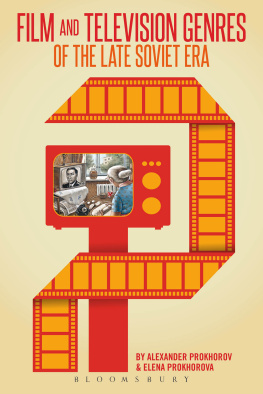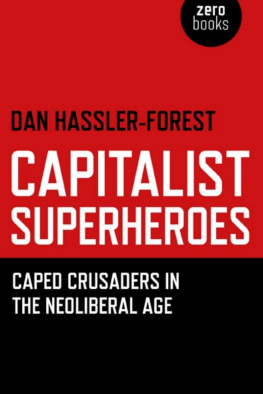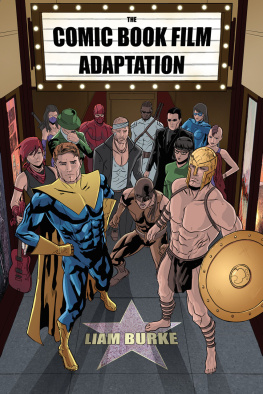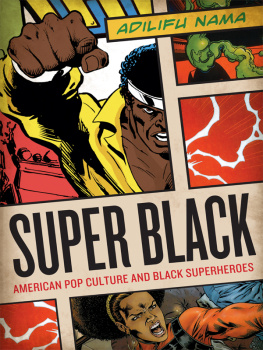Contents
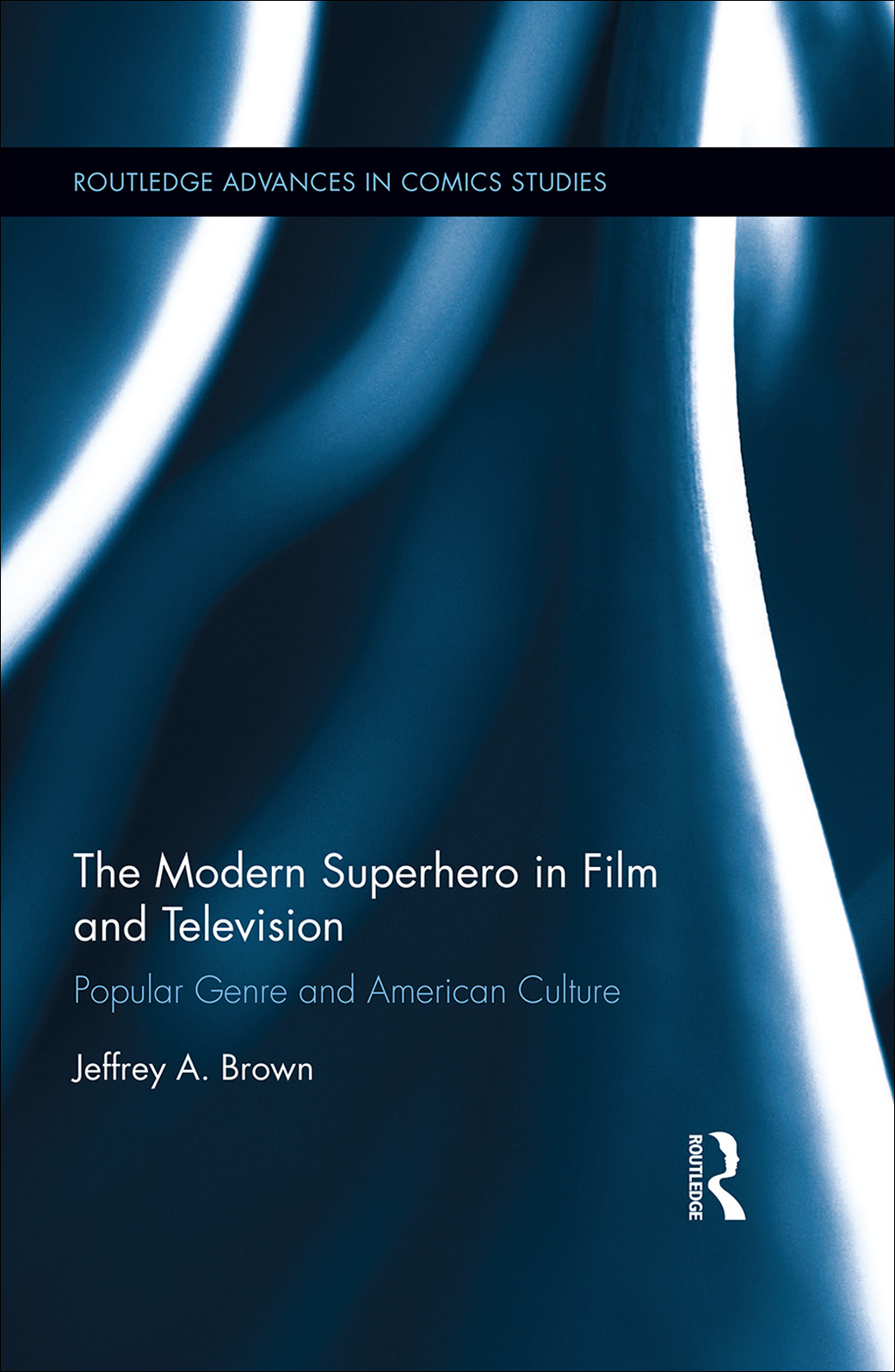
The Modern Superhero in Film and Television
Hollywoods live-action superhero films currently dominate the worldwide box-office, with the characters enjoying more notoriety through their feature film and television depictions than they have ever before. This book argues that this immense popularity reveals deep cultural concerns about politics, gender, ethnicity, patriotism and consumerism after the events of 9/11. Superheroes have long been agents of hegemony, fighting for abstract ideals of justice while overall perpetuating the American status quo. Yet at the same time, the book explores how the genre has also been utilized to question and critique these dominant cultural assumptions.
Jeffrey A. Brown is a Professor in the Department of Popular Culture at Bowling Green State University, USA. He is the author of Black Superheroes: Milestone Comics and Their Fans, Dangerous Curves: Action Heroines, Gender, Fetishism, and Popular Culture, and Beyond Bombshells: The New Action Heroine in Popular Culture.
Routledge Advances in Comics Studies
Edited by Randy Duncan, Henderson State University
Matthew J. Smith, Radford University
1 Reading Art Spiegelman
Philip Smith
2 The Modern Superhero in Film and Television
Popular Genre and American Culture
Jeffrey A. Brown
First published 2017
by Routledge
711 Third Avenue, New York, NY 10017
and by Routledge
2 Park Square, Milton Park, Abingdon, Oxon OX14 4RN
Routledge is an imprint of the Taylor & Francis Group, an informa business
2017 Taylor & Francis
The right of Jeffrey A. Brown to be identified as author of this work has been asserted by him in accordance with sections 77 and 78 of the Copyright, Designs and Patents Act 1988.
All rights reserved. No part of this book may be reprinted or reproduced or utilised in any form or by any electronic, mechanical, or other means, now known or hereafter invented, including photocopying and recording, or in any information storage or retrieval system, without permission in writing from the publishers.
Trademark notice: Product or corporate names may be trademarks or registered trademarks, and are used only for identification and explanation without intent to infringe.
Library of Congress Cataloging-in-Publication Data
Names: Brown, Jeffrey A., 1966 author.
Title: The modern superhero in film and television: popular genre and American culture / by Jeffrey A. Brown.
Description: New York: Routledge, 2016. | Series: Routledge advances in comic studies; 2 | Includes bibliographical references and index.
Identifiers: LCCN 2016026537
Subjects: LCSH: Superhero filmsUnited StatesHistory and criticism. | Superhero television programsUnited StatesHistory and criticism.
Classification: LCC PN1995.9.S76 B76 2016 | DDC 791.43/652dc23
LC record available at https://lccn.loc.gov/2016026537
ISBN: 978-1-138-89778-6 (hbk)
ISBN: 978-1-315-70898-0 (ebk)
Typeset in Sabon
by codeMantra
For Hudson and Chance, my real superheroes
Genres have been an important categorical strategy for Hollywood entertainments since the dawn of feature films in the early years of the twentieth century. As film (and later television) genres emerged and developed they typically carried on the core elements previously established in literature, theatre, and vaudeville. At times the unique creative properties of motion pictures meant that film genres introduced new components, developed a range of subgenres, or mutated into entirely unique forms in their own right. Hollywood has always diversified its content and produced a wide range of genre fare in an effort to attract as many ticket buying viewers as possible. Still, different moments in American culture have been closely aligned with specific film genres. In the silent film era slapstick comedies and melodramas ruled; during the Great Depression escapist musicals were popular; film noir represented a bleak view of the world informed by the trauma of World War II; the Cold War climate of the 1950s gave rise to science fiction horror; the ideology of the Ronald Reagan years were reflected in the muscular action movies of the 1980s, and so on. In these early years of the twenty-first century, superheroes have become the undeniably dominant American film genre. Live-action superheroes achieved some rare earlier successes on both the big and small screen. In the 1940s several superheroes were brought to life on film in popular adventure serials including Captain Marvel (1941), The Batman (1943), Captain America (1944) and Superman (1948). On television, programs like The Adventures of Superman (19521958), Batman (19661968) and The Incredible Hulk (19781982) proved popular with viewers at home. But the relatively small-scale success of these early live action portrayals of superheroes was dwarfed by the blockbuster potential of the genre that was exemplified most notably with Richard Donners Superman (1978) and Tim Burtons Batman (1989).
The current wave of superhero blockbusters consistently dominates worldwide box offices on an unprecedented scale. Twenty superhero movies are currently ranked in the top 100 grossing films of all time, a remarkable feat given how recently superhero films are being produced with any regularity. In fact, since The X-Men started the new wave of superhero feature films in 2000, there has been at least one superhero movie in the top 10 grossing films each year, except for 2001 when none were released. In five of those years a superhero movie was ranked number one (Spider-Man 2002, Spider-Man 3 2007, The Dark Knight 2008, The Avengers 2012, Guardians of the Galaxy 2014) and seven of those years saw two or more superhero movies in the top ten. This is a remarkable trend that shows no signs of letting up. Dozens of high profile sequels, reboots and new franchises are about to be released, or are in production, including Warner Brothers Justice League and, Suicide Squad films, and Marvel/Disneys Dr. Strange and The Black Panther, as well as the continuing adventures of characters like Iron Man, Captain America and Superman. Likewise, the popularity of live action superheroes has found its way onto television screens via network, cable and online distribution with series like Arrow (2012current), Marvels Agents of S.H.I.E.L.D. (2013current), Gotham (2014current), The Flash (2014current), Agent Carter (20152016), Daredevil (2015current), Supergirl (2015current), Jessica Jones (2015current), and Powers (2015current). Moreover, numerous other characters are set to receive their own live action series over the next few years including Luke Cage, Iron Fist, and The Punisher. The related merchandising for all of these popular properties also means that superheroes are more visible than ever before, well beyond their on-screen presence. Superhero t-shirts, bags, shoes, phone cases, collectibles, hats, and thousands of other products are available everywhere. In short, superheroes are having their greatest moment in the Hollywood spotlight and in the American imagination. In characteristically hyperbolic comic book terms, the twenty-first century is a new golden age for superheroes.
The immense popularity of live action superhero adaptations, and Hollywoods relatively recent embrace of comic book characters, reflects a shifting range of cultural, political, economic, industrial and technological issues. The purpose of this book is to outline and analyze the myriad reasons why the current Hollywood version of superheroes has come to dominate the entertainment industry, and to consider what this genre reveals about cultural concerns and beliefs. Despite the assumption often made by film critics, viewers and even some of the filmmakers that superhero movies are merely simple-minded and juvenile entertainment (derived from silly and childish comic books), there is no simple answer for why this genre is so appealing at this moment in history. There is a wide range of intersecting, interrelated, and even conflicting, themes that are particularly relevant to contemporary audiences. In the traumatized post-9/11 climate, superhero movies provide a reassuring fantasy of Americas ability to withstand terrorist attacks, often metaphorically rewriting the tragedy of that horrible day. Superheroes also act out a comforting nostalgia for a simpler time, a less conflicted perception of America as not just a nation but an ideal, when the good guys were easy to spot and the bad guys were always defeated. Commercially, the genre represents the climate of late capitalist consumerism and the entertainment industrys reliance on tent-pole films to facilitate revenue streams across numerous multimedia platforms. The spectacular nature of these live action superhero films is also premised on the technological development of digital special effects that allow fantastical characters to appear believable, and most importantly, to provide a point of identification for viewers. Moreover, as the live action superhero genre develops and expands, it increasingly exposes, appeals to, and at times challenges cultural beliefs about racial politics, gender expectations, nationalism, morality and capitalism that are all too often glossed over as vague assumptions about truth, justice, and the American way.








